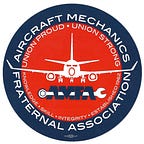AMFA Joins SWA Flight Attendants in their Efforts as there is Nothing Left to Give
Dear Ms. Montgomery:
The airline industry, including Southwest Airlines (SWA), has experienced tremendous growth in flights this summer as people emerge from the Covid lockdowns. The problem has been that the available staffing to fly, attend, and maintain those flights has not kept pace with the growth in the daily flight schedule. To make matters worse, SWA Maintenance Tech-ops Senior Vice President implemented an entirely new Aircraft Maintenance recordkeeping and operational maintenance tracking system called Maintenix (MXi) that is painfully in disarray resulting in inefficient maintenance operations. This new system requires much more involvement than previous systems, and the steep learning curve is creating further delays. So far, there have been more than 100 data entry programming glitches identified affecting parts ordering, communications between systems, routine data entry, and recordkeeping. The unfamiliarity of the system combined with programming errors is making a bad situation even worse.
All these vital violations of status quo for our workgroups are creating unsustainable operation and flight delays, including increased aircraft maintenance ground time due to MXi. This situation has left the SWA Flight Attendants (TWU Local 556) weary, exhausted, frustrated and feeling forgotten. All of us frontline employees are trying to keep the jobs we love, be compliant, as well as ensure our customers end up to their final destinations safely and on time.
In a recent letter to Southwest Airlines CEO Gary Kelly, the TWU Local 556 Flight Attendants outlined specific concerns as critical stakeholders and exposed the mistreatment the SWA Flight Attendants are having to endure. Additionally, your letter asked CEO Gary Kelly to immediately terminate the use of emergency sick call procedures, stop adding additional pairings into the SWA operations, diminish the long and extended duty hours, and help protect Flight Attendants as they deal with increased air rage incidents. SWA frontline employees are feeling increasingly frustrated, overworked, and unsupported — a profound situation that can create safety issues for the flying public with long lasting repercussions.
SWA Management’s gross mishandling of these systemic and chronic issues with frontline employees across the board are also negatively affecting the flying public, as evidenced by the unprecedented number of canceled and delayed flights. Management has recently acknowledged the problems and claims to be addressing the matters, even though they are ultimately the cause. Grievances are a predictable outcome of over-scheduling flights, understaffing, and recurrent poor planning, and we must believe there was a conscious management decision to put shareholder interests ahead of the flying public and employee interests once again. While we appreciate management’s recognition of the problem, it remains to be seen whether they prioritize realistic solutions to address deficiencies or focus on profits with inadequate consideration of the customer and employee charged with their safety. If history is any indication of how this will play out, the smart money is on profits.
AMFA stands adamantly with the TWU Local 556. We implore Southwest Airlines to expediently identify and implement competent and sufficient solutions to ensure the number of flights aligns with an adequate number of employees in collaboration with respective unions. Furthermore, we urge SWA Management to competently accelerate improvements for all workgroups, and change course to ensure the flying public will have a safe and comfortable flying experience.
Fraternally,
Bret Oestreich
National Director
For more information from AMFA, click the link below to visit AMFA National: https://www.amfanational.org/index.cfm?zone=/unionactive/view_article.cfm&HomeID=856444
